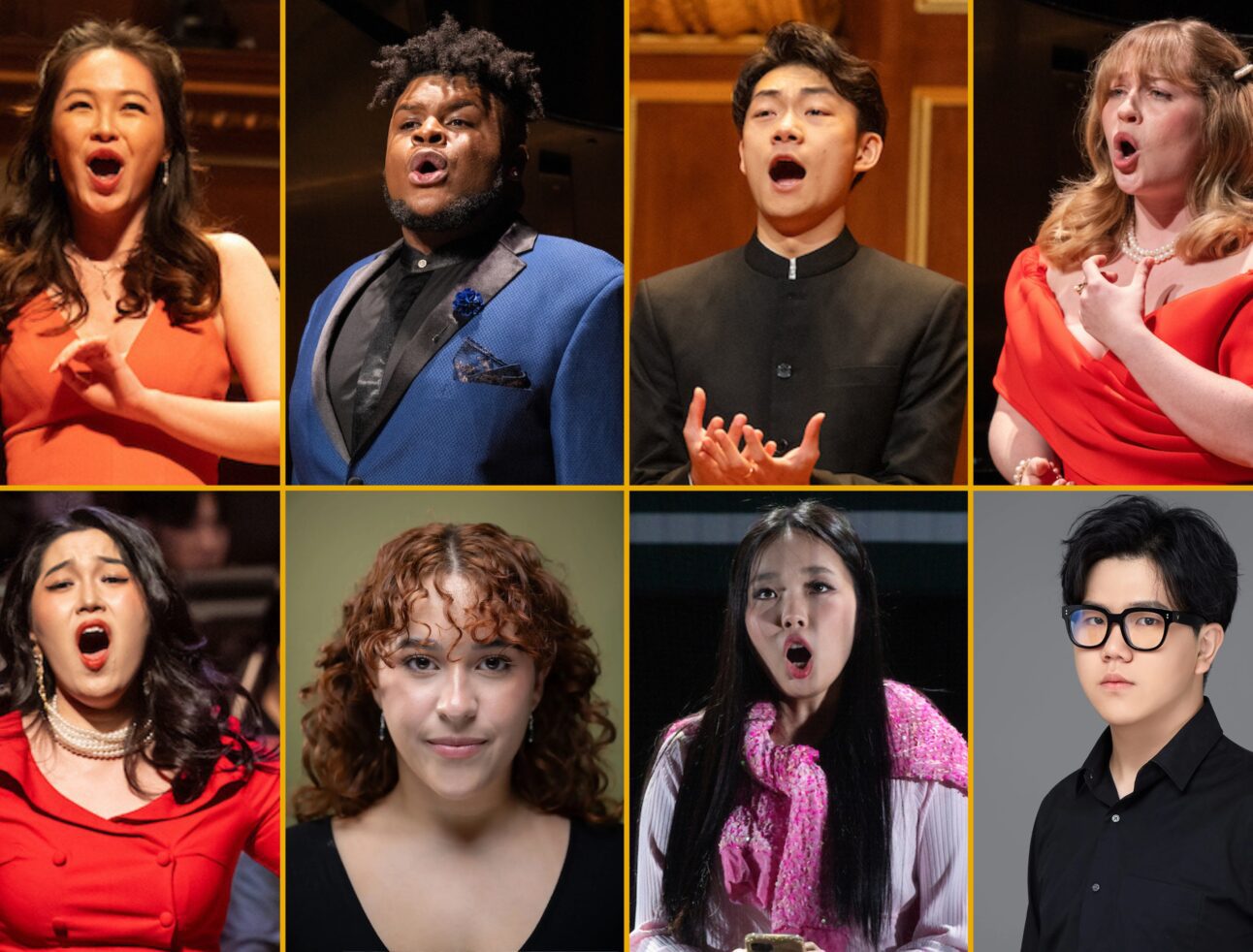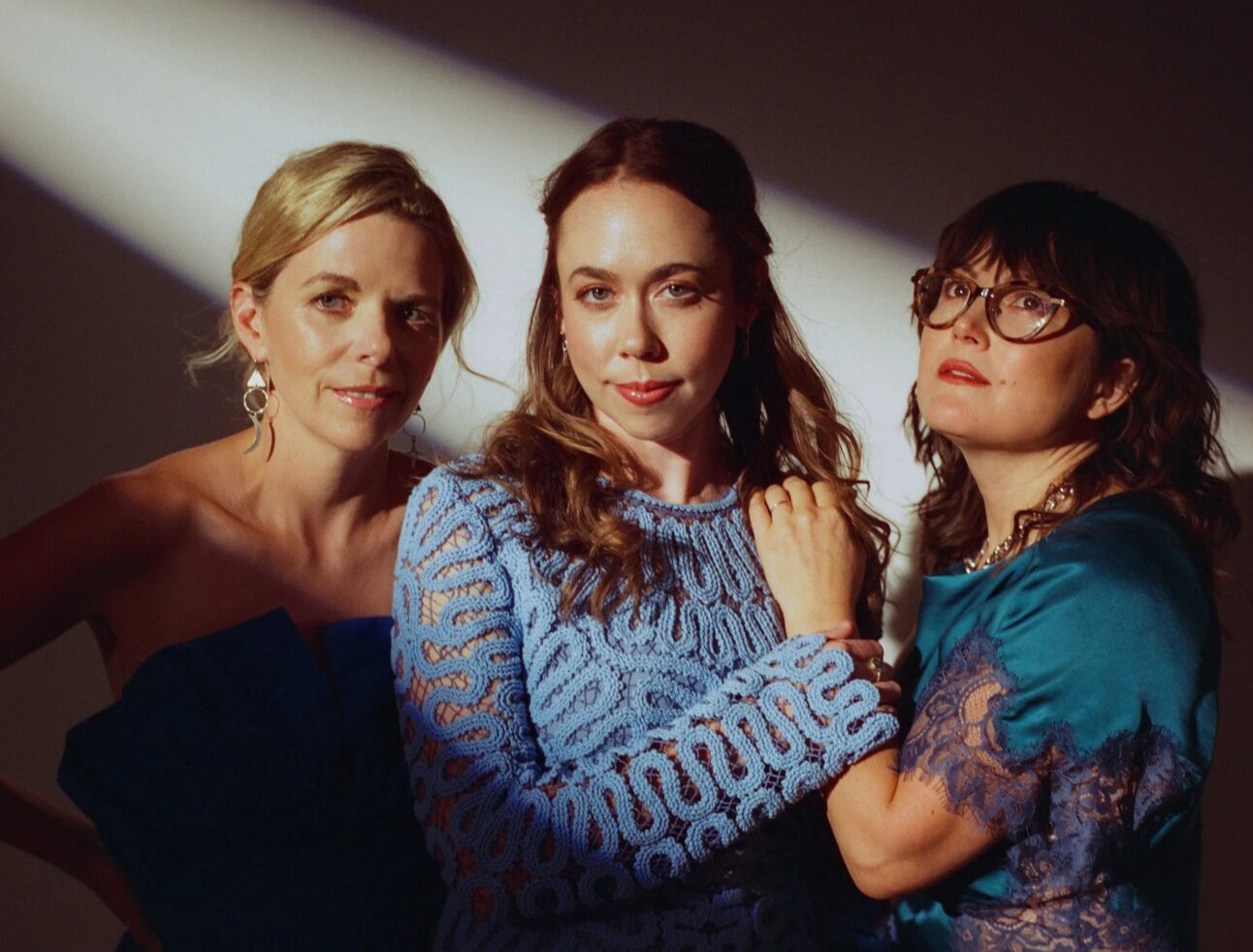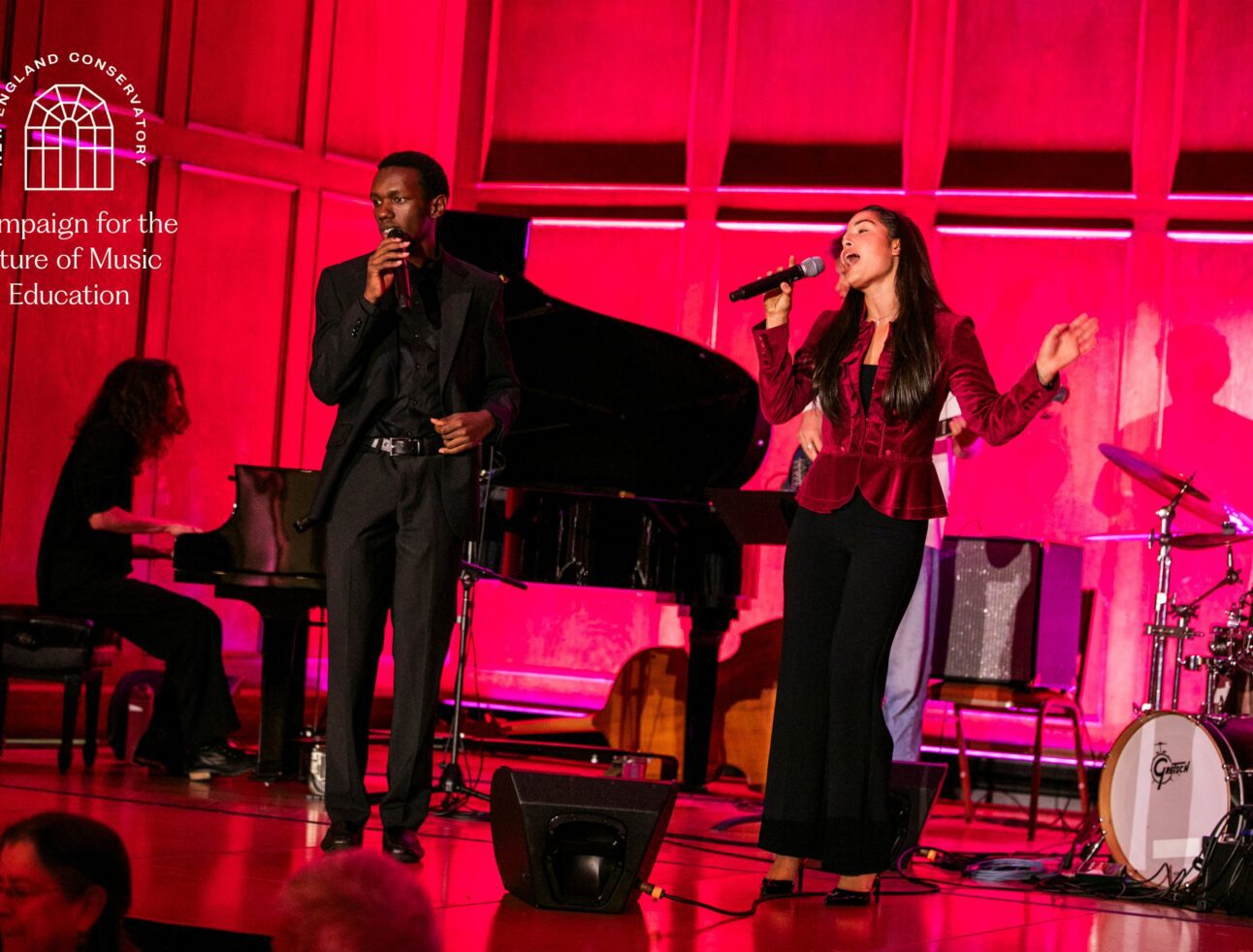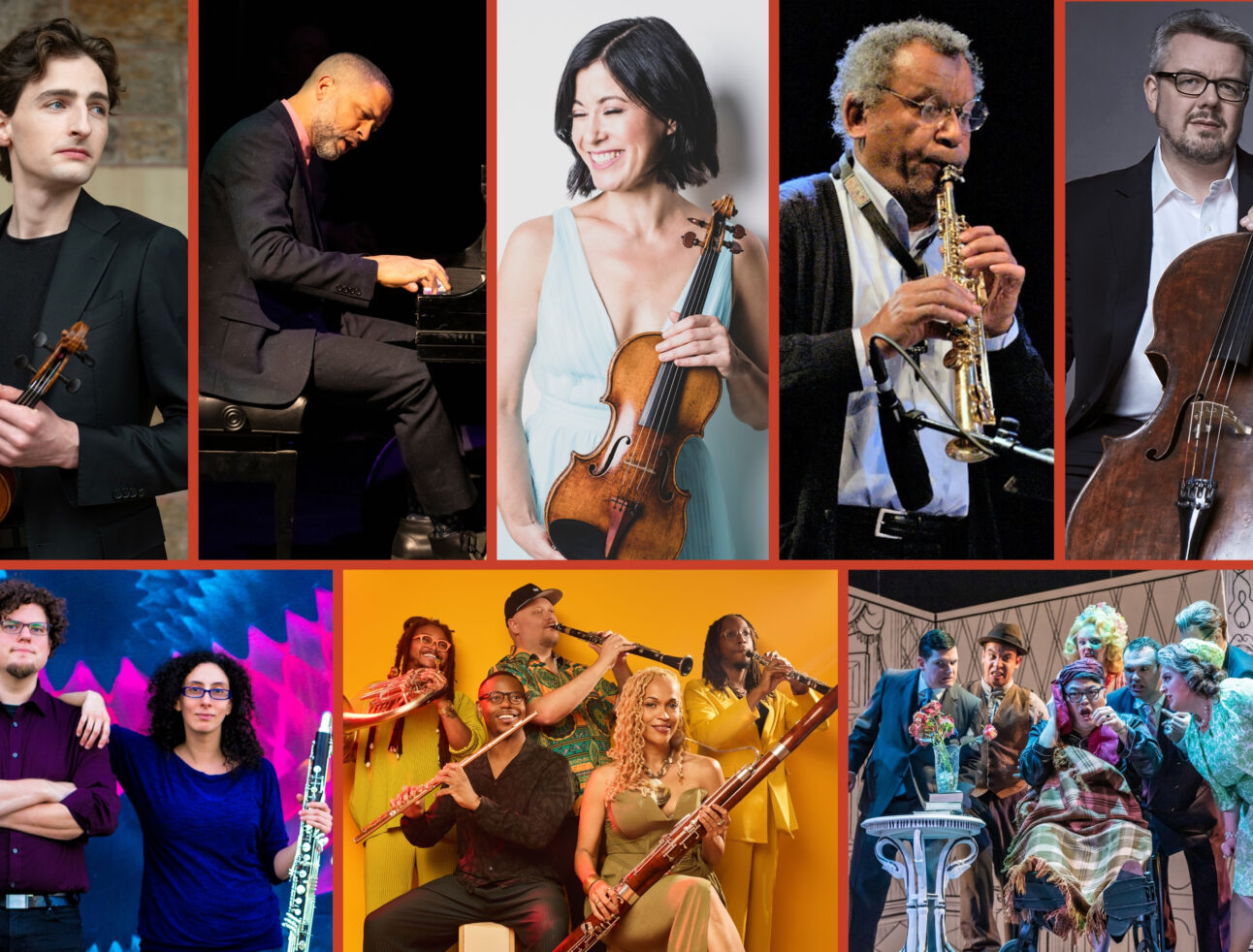In February 2023, talented pianist and composer Charles Berofsky ’24 MM amazed Jordan Hall audience members during a concert with NEC’s conductorless Chamber Orchestra. He was the soloist for Mozart’s Piano Concerto No. 14 in E-flat Major, K. 449, including a self-composed cadenza within his exceptional performance. Berofsky earned the solo opportunity as the winner of NEC’s 2022 Piano Concerto Competition, one of many honors the budding sensation has achieved in under two years at NEC so far, where he is studying for his Master of Music with faculty member HaeSun Paik following his Bachelor’s at Eastman School of Music.
Berofsky has been a member of two trios selected for NEC’s prestigious Honors Ensemble program in successive years: Trio Sponte (2023) and the Newbury Trio (2022-2023). In 2023, he was one of five NEC students selected for the Borromeo String Quartet’s yearly Guest Artist Award. His accolades abound outside of NEC, as well, with other recent awards including Third Prize at the 10th New York International Piano Competition in 2022; First Prize and an audience favorite prize at the 2021 Thousand Islands International Piano Competition in Cape Vincent, New York; Second Prize at the 2021 Chautauqua Piano Competition; and Runner-Up in the 2021 New York MTNA piano competition (Young Artist Division). For his compositions, he’s received a commission from the American Guild of Organists and four prizes from the Eastman composition department.
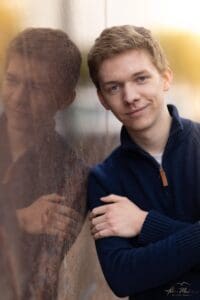
What did your journey into music look like? When did you know you wanted to pursue piano seriously?
My parents are violinists, and my mom’s parents are pianists, so music was in my life a lot growing up. My parents had me start cello lessons at age four, and then I switched to piano at six. I think I was somehow drawn towards that more—perhaps I was able to focus better when I didn’t have to spend so much time setting up my instrument before being able to play it! But my younger brother ended up becoming a cellist, so what do you know? My parents didn’t necessarily want us to go into music, but they just thought it was important that we be exposed to it, take lessons, and have it be a part of our life. I guess it wasn’t until late middle school or early high school that I realized, “Music is what I want to do with my life.” There certainly wasn’t anything else I wanted to do more. I was also really interested in composition, and I wanted to pursue that more seriously as well.
What drew you to New England Conservatory?
It was in large part my teacher, Ms. Paik. It’s been incredible to work with her over the past couple years. I think the other big thing for me was location. I honestly wasn’t sure where I wanted to go for my master’s degree at first; I really loved Eastman during my time there as an undergrad but I knew I wanted to spend some time in a new place afterwards. There’s so much history and musical culture on the East Coast in cities like Boston, New York, and Philly, and when I visited Boston for the first time to have a lesson with Ms. Paik, I fell in love with this city immediately. There’s constantly great music happening in a place like this.
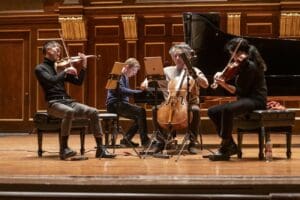
How would you describe your relationship with HaeSun Paik?
I haven’t been with her nearly as long as my previous teachers, but she’s just been great. She’s helped me listen to myself in a more analytical, objective way and to think about what I’m doing when producing sound without simply relying on instinct. She’s big on clarity! Clarity of sound, clarity of intent. She hears so well, and I think it’s clear from listening to my studiomates that she helps all of us to also hear ourselves better. It’s amazing to get to listen to her play the piano. She can sit down and play something you’re currently working on, and it will sound better than you could ever dream of playing it yourself. One of her mantras is, “Why are you using that much pedal?” She makes you realize that you don’t need to use it as much as you think you do, and she uses her hands so effectively that she often barely needs any at all.
She’s also incredibly generous with her time. If you have something coming up, like a competition or something where you need that extra time and help, she really goes the extra mile and sees that you’re ready, which I really appreciate. Lessons with her often include a conversation; you never feel like you’re rushed out the door.
You have been in two trios selected for NEC’s Honors Ensemble program — Newbury Trio and Trio Sponte. What has that experience been like for you?
It’s been really great, and I have to say right off the bat how lucky I am in this regard. Getting to put a full recital program together is amazing, and I think it’s a great experience to prepare young musicians for the professional world. That is what we aspiring chamber musicians will all be doing when we’re out of school, and it makes one feel very professional when one has to curate one’s program. You get to think about what music you really want to play, and how an interesting program of full works meshes together. Having this goal in mind is inspiring, and it has helped me to focus throughout my time at NEC.
You won NEC’s 2022 Piano Concerto Competition with your performance of Mozart’s Piano Concerto No. 14 in E-flat Major, K. 449. What was it like to perform that piece with your own original cadenzas on the Jordan Hall stage?
I’m a big fan of Robert Levin, a renowned pianist and scholar who has been central in the world of historical performance. He’s talked at length about the importance of the composer’s relationship to the instruments of their time, and he’s well-known for being able to improvise fluently in the style of Mozart, among others. He’s been an idol of mine for a while! He’s a big proponent of not just doing what’s on the page but thinking about what Mozart would have done—how he would have gone on stage (perhaps a little underprepared) and improvised his cadenzas, making the music feel alive and different every time. So when I was going to enter this competition at NEC with a Mozart concerto, I knew I wanted to do something in this vein. I wanted to write a cadenza that sounded Classical, while also putting my own spin on it. It took me a few weeks to fully write out what I wanted, and when I first played my cadenza at the end of the first movement for Ms. Paik, she was very supportive. I remember when she told me something to the effect of, “It’s good! It kind of sounds like Beethoven.” And I thought that was funny because that wasn’t my intention at all, but I was happy with that assessment. She then proceeded to give me a lesson on my cadenza, just as she would have on anything else. It was really amazing, and a little surreal, to have your teacher teach you how to play something you’ve written yourself.
Have you been able to learn from your peers at NEC?
Definitely. My studiomates always play really, really well, and getting to listen to them (and other pianist friends of mine) constantly has been a privilege. I’ve honestly also learned a lot from string players, which my parents would be happy to hear! I think it helps to learn from other instrumentalists and think about what they can do, oftentimes more naturally than pianists. So playing constantly with strings and having chamber coachings with pianists and non-pianists alike has been great for me.
Have you worked with any other faculty members aside from Ms. Paik?
My trio coached with Kristopher Tong during my first year at NEC, and last semester I had coachings with Merry Peckham. My trio is now co-coaching with Vivian Weilerstein and Kim Kashkashian. In terms of solo piano, I’ve had some lessons with Alessio Bax and Jonathan Biss. I really appreciate that Ms. Paik is open to her students learning from teachers with different perspectives. Profs. Bax and Biss aren’t at NEC year-round, so when they’ve come in the past she’s told me to play for them and get their takes on the pieces I’m working on.
What are your professional goals after graduating with your Master of Music this spring?
I plan to audition for schools in Germany. Studying in Europe has been my dream for a while. I’m hoping to be able to do a Konzertexamen, which is their equivalent of an Artist Diploma here in the States—it’s about two years long and very focused on playing, with no coursework.
What draws you to Germany?
I started learning German in high school, and I loved it. I had some great German teachers at Eastman. My favorite music has always been by the beloved German/Austrian composers (Bach, Mozart, Beethoven, Brahms). The pieces these composers composed that have lyrics—either sacred music or songs, like Bach’s Passions or Lieder by Schubert and Schumann—I love the way these composers used language. I truly love the sound of the German language, how the text relates to the music, and how these composers had such a mastery of their craft. So I’ve had an interest in German history and culture for a long time.
It also helps that my girlfriend is studying music in Germany! She shares my love for German culture and we have an appreciation for various political and social things about the country today. She’s getting a master’s degree at the Hochschule in Weimar.
The music scene in Europe is very exciting, and that’s one of the more professional reasons l want to go. Classical music is such an ingrained part of Germany’s society, and one statistic I find fascinating is that there are more orchestras per capita in Germany than in any other country. A lot of pianists are moving there, particularly to Berlin, which is relatively inexpensive despite being a cultural center with so much going on. So all in all, it’s easy to see oneself making a career in music there.
What is one of your biggest takeaways from your time at NEC?
NEC is just really inspiring because the level is so high. There are so many great people doing what they’re doing. There are students here who have won some of the biggest international competitions—it’s wild knowing that some of your peers are doing that. And of course we can’t all be pursuing something that big, but you can still tell that everybody here works hard and genuinely cares about what they’re doing.
What do you like to do for fun outside of school and music?
I love to play Nintendo Switch, but I let my brother have it this school year, so I sadly haven’t been able to play it recently. (He brings it home during breaks, so we get to bond over it then!) I like walking with people and eating good food, and I’m interested in videos about history, geography, and language.
Don’t miss Charles Berofsky performing a solo recital in Williams Hall on March 28 at 8 p.m. and with fellow members of Trio Sponte (Nick Hammel ’24 MM, violin and Stephanie Yang ’23, ’25 MM, cello) during their Honors Ensemble concert on May 5 at 7:00 p.m.
“When I visited Boston for the first time to have a lesson with Ms. Paik, I fell in love with this city immediately. There’s constantly great music happening in a place like this.“
Charles Berofsky ’24 MM
